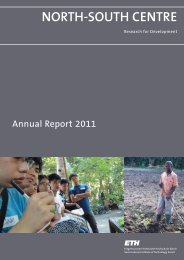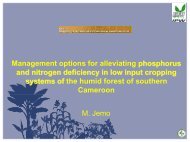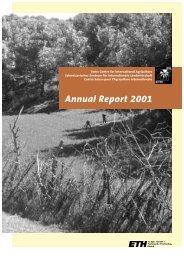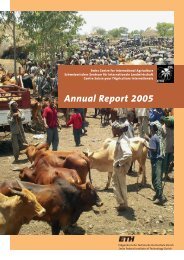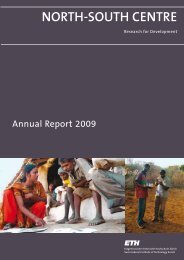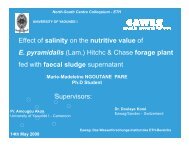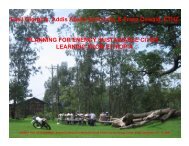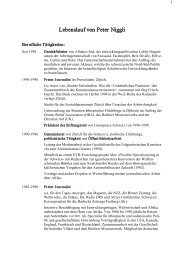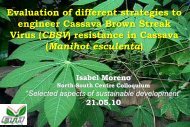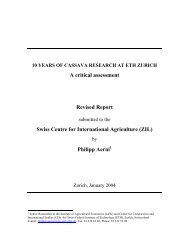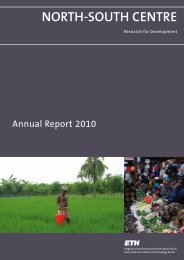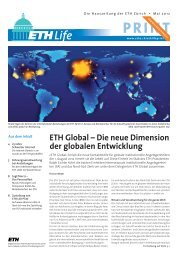Research Fellow Partnership Programme (RFPP)Research Fellow Partnership Programme for Agriculture,Forestry and Natural Resources – OverviewThe Research Fellow Partnership Programme for Agriculture,Forestry and Natural Resources (RFPP) is a long-standing programmeaiming at fostering the links between the Swissdevelopment-oriented research community and internationalagricultural research institutions, mainly the centres of theCGIAR. RFPP is a support programme targeting young postgraduatesfrom developing countries as well as fromSwitzerland at the beginning of their academic career.The programme is funded by the SDC, and its management ismandated to ZIL. In 2005, a new programme phase lastinguntil 2009, has been agreed upon. Besides administrativechanges, this new contract now includes modest support fortraining at the MSc level by supporting internships at centresof the CGIAR or associated centres, which complements thetraditional RFPP support for doctoral and post-doctoral fellows.This new activity of internships will be implemented inthe second half of 20<strong>07</strong>.Eight fellowships were concluded during the reporting period.Matthew Abang, Thomas Koellner, David Odongo and NicolasRoost successfully finished their post-doctoral projects. All ofthem are pursuing their academic careers as senior scientistsat major international research institutions. Gabriela Chacón,Frank Muttenzer, Kaspar Schmidt, Joachim Sell and ChristineZundel have successfully obtained their doctoral degrees, andare employed in positions validating their earlier researchexperience.stem rust Ug99, which is rapidly spreading from Eastern Africaand threatening the world’s agriculture, as resistance breedingagainst this strain has not been successful to date.Christine Flury’s post-doctoral project is developing a markerbasedtool to assess the effective population size of Africancattle breeds for conserving genetic diversity. This tool isexpected to be a valuable instrument for future interventionsfor the conservation of animal genetic resources of Africancattle. The doctoral candidate Fotso Kuate will be investigatingthe interactions of the ant Anoplolepis tenella and the Africanroot and tuber scale, which is an emerging major pest of cassavain Central Africa. The post-doctoral fellow Martin Jemo iscontinuing the RFPP partnership between the <strong>ETH</strong> Zurich andIITA, investigating whether the rapid yield decrease after forestclearance in Cameroon is caused by changes in structure ofthe arbuscular mycorrhizal fungi in the soil. MarcoD’Alessandro’s post-doctoral fellowship examines how thescents emitted by maize plants when attacked by parasiticwasps may be used in future maize breeding.Finally, we have to mourn the death of Walter Ogutu. Hebegan his doctoral work on the invasiveness of Prosopis inKenya and died in a car accident while working for the project.Our thoughts are with his family and we keep him in mind asa great person who never lost his sense of humour whileworking hard and pursuing ambitious science.Marc ZossIn <strong>2006</strong>/<strong>07</strong>, six fellowships have been started. Peter Njaustarted his doctoral fellowship on the analysis of the wheat42
Research fellowKaspar Schmidt, <strong>ETH</strong> ZurichSupervisorsJohn <strong>North</strong>ridge, IRDD, University of Reading,UK / Jean-Pierre Sorg, <strong>ETH</strong> Zurich / BronislavI. Venglovsky, Forest Research Institute,KyrgyzstanCollaboratorsCarol J. Colfer, CIFOR, Indonesia / Jean-MarieSamyn, Intercooperation / Gulnaz T. Jalilova,Forest Research Institute, KyrgyzstanDurationMay 2001 – October <strong>2006</strong>Research Fellow Partnership Programme (RFPP)Knowledge and strategies of local peopleinvolved in forest managementin the walnut-fruit forests in KyrgyzstanThe walnut-fruit forests of <strong>South</strong>ern Kyrgzystan are part of arich cultural landscape, a mosaic of natural forest stands,plantations, arable fields and open areas. They offer a widerange of agricultural and forest products that are used bylocal communities. This research project was aimed at exploringways in which local people can contribute to the sustainablemanagement of these state-owned forests. Researchfocused on forestry-relevant knowledge of local people, theirforest use practices seen in the context of their overall livelihoodsystems, on governance issues and on questions regardingbiodiversity conservation.This project has also contributed to scientific capacity building.Gulnaz Jalilova, a young female Kyrgyz scientist andformer member of the project team, succeeded in securing ascholarship to continue her studies at the University of NaturalResources and Applied Life Sciences (BOKU) in Vienna, Austria.In terms of knowledge, the study found that, generally, localpeople have solid forestry skills and relevant technical andmarketing knowledge. Applied ecological knowledge, however,is less widespread. This underlines the need forsilvicultural advice to be provided by foresters. Other socioeconomicresults show that the walnut-fruit forests are a keyresource for subsistence and an important, but rather unreliablesource of cash income. Key governance aspectscovered in the analysis include equity issues regarding accessto forest resources, different models to involve local people inforest management, and decision-making regarding forestmanagement. From the findings, recommendations formobilising and extending the knowledge available with localpeople are derived. New roles for local people, state bodiesand civil society are envisaged as these stakeholders movetowards a more participatory management system for thewalnut-fruit forests.An Uzbek leaseholder and his son show seedlings of walnut, dogroseand other fruit trees.43
- Page 1 and 2: Swiss Centre for International Agri
- Page 3 and 4: Table of contentsZIL members. . . .
- Page 5 and 6: EditorialThe present Annual Report
- Page 7 and 8: An introduction to ZILThe ZIL proje
- Page 9 and 10: An introduction to ZILThe Progress
- Page 11 and 12: An introduction to ZILOn September
- Page 13 and 14: An introduction to ZILIn 2007, the
- Page 15: An introduction to ZILThe ZIL Execu
- Page 18 and 19: Impact StudyThe development impact
- Page 20 and 21: Impact Study18market opportunities
- Page 22 and 23: Impact Study20ral (N), human (H), f
- Page 24 and 25: ERA-ARDThe European Research Area i
- Page 26 and 27: ZIL research projectsOverviewLivest
- Page 28 and 29: ZIL research projectsIntegratedPest
- Page 30 and 31: ZIL research projectsEcosystemservi
- Page 32 and 33: ZIL research projectsLivestocksyste
- Page 34 and 35: ZIL research projectsLivestocksyste
- Page 36 and 37: ZIL research projectsLivestocksyste
- Page 38 and 39: ZIL research projectsLivestocksyste
- Page 40 and 41: ZIL research projectsLivestocksyste
- Page 42 and 43: ZIL research projectsLivestocksyste
- Page 46 and 47: Research Fellow Partnership Program
- Page 48 and 49: Research Fellow Partnership Program
- Page 50 and 51: Research Fellow Partnership Program
- Page 52 and 53: Research Fellow Partnership Program
- Page 54 and 55: Research Fellow Partnership Program
- Page 56 and 57: Research Fellow Partnership Program
- Page 58 and 59: Research Fellow Partnership Program
- Page 60 and 61: Research Fellow Partnership Program
- Page 62 and 63: Research Fellow Partnership Program
- Page 64 and 65: Seed MoneySeed Money Projects 2003-
- Page 66 and 67: Other international projects of ZIL
- Page 68 and 69: Teaching activities related to deve
- Page 70 and 71: Development-related thesesSupervisi
- Page 72 and 73: Development-related thesesSuperviso
- Page 74 and 75: PublicationsPublications72Refereed
- Page 76 and 77: PublicationsMathayya, S., Thankacha
- Page 78 and 79: PublicationsVariaZIL funded project
- Page 80 and 81: PublicationsRFPP projectsAbang, M.,
- Page 82 and 83: PublicationsStupak, M., Alder, A.,
- Page 84 and 85: PublicationsStickstoffumsatz und di
- Page 86 and 87: PublicationsOther international pro
- Page 88 and 89: Publicationssubandinen Waldweide-Sy
- Page 90 and 91: ZIL members, collaborators and part
- Page 92 and 93: ZIL members, collaborators and part
- Page 94 and 95:
AccountsAccounts 2006*Balance, Dece
- Page 96:
Swiss Centre for International Agri




